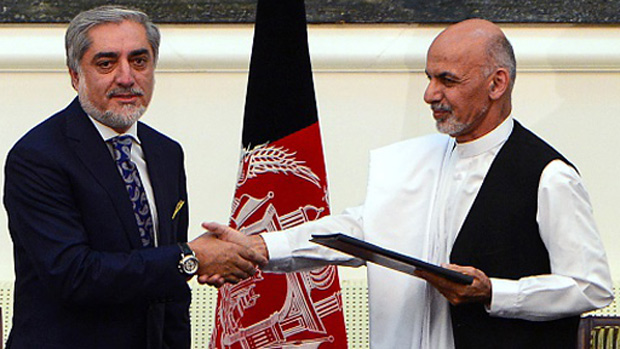Afghan election: Ghani and Abdullah form unity government
Ashraf Ghani becomes president of Afghanistan five months after first votes were cast

A free daily email with the biggest news stories of the day – and the best features from TheWeek.com
You are now subscribed
Your newsletter sign-up was successful
Three months of political deadlock have come to an end in Afghanistan after Ashraf Ghani and Abdullah Abdullah signed a power-sharing agreement negotiated by the United States.
Ghani will become president of the country and Abdullah will work as chief executive, effectively having the powers of a prime minister, and will be responsible for the day to day running of the country.
The two opponents had been involved in a bitter battle over disputed run-off results in this year's presidential election that threatened to create a sectarian divide within the country. Ghani support is largely Pashtun and Abdullah has the backing of the Tajik population.
The Week
Escape your echo chamber. Get the facts behind the news, plus analysis from multiple perspectives.

Sign up for The Week's Free Newsletters
From our morning news briefing to a weekly Good News Newsletter, get the best of The Week delivered directly to your inbox.
From our morning news briefing to a weekly Good News Newsletter, get the best of The Week delivered directly to your inbox.
Ghani, a former finance minister and World Bank official and his opponent Abdullah, a former foreign minister, sealed the deal with a handshake and an embrace.
A formal inauguration ceremony is expected to take place within the next week and will mark the first transfer of power in ten years as President Hamid Karzai steps down.
"This agreement marks an important opportunity for unity and increased stability in Afghanistan," the White House said in a statement. "We continue to call on all Afghans — including political, religious, and civil society leaders — to support this agreement and to come together in calling for cooperation and calm."
However, not everyone is as optimistic. "They have created a fabricated national unity government, and I don’t think such a government can last," Wadir Safi, a political analyst at Kabul University, told the New York Times.
A free daily email with the biggest news stories of the day – and the best features from TheWeek.com
Both Ghani and Abdullah now face many challenges including a strengthening Taliban, overwhelmed security forces, the withdrawal of Nato troops, a weak economy and high unemployment.
The deal has been described as a major victory for US Secretary of State John Kerry, who brokered the talks and got the two sides to agree to the idea of a power-sharing deal in July. The US is now waiting to see whether Ghani will uphold his pledge to sign a bilateral security agreement which would allow some US troops to remain in the country after their combat mission comes to an end this year.
-
 Ex-South Korean leader gets life sentence for insurrection
Ex-South Korean leader gets life sentence for insurrectionSpeed Read South Korean President Yoon Suk Yeol was sentenced to life in prison over his declaration of martial law in 2024
-
 At least 8 dead in California’s deadliest avalanche
At least 8 dead in California’s deadliest avalancheSpeed Read The avalanche near Lake Tahoe was the deadliest in modern California history and the worst in the US since 1981
-
 Political cartoons for February 19
Political cartoons for February 19Cartoons Thursday’s political cartoons include a suspicious package, a piece of the cake, and more
-
 Epstein files topple law CEO, roil UK government
Epstein files topple law CEO, roil UK governmentSpeed Read Peter Mandelson, Britain’s former ambassador to the US, is caught up in the scandal
-
 Iran and US prepare to meet after skirmishes
Iran and US prepare to meet after skirmishesSpeed Read The incident comes amid heightened tensions in the Middle East
-
 Israel retrieves final hostage’s body from Gaza
Israel retrieves final hostage’s body from GazaSpeed Read The 24-year-old police officer was killed during the initial Hamas attack
-
 China’s Xi targets top general in growing purge
China’s Xi targets top general in growing purgeSpeed Read Zhang Youxia is being investigated over ‘grave violations’ of the law
-
 Panama and Canada are negotiating over a crucial copper mine
Panama and Canada are negotiating over a crucial copper mineIn the Spotlight Panama is set to make a final decision on the mine this summer
-
 Why Greenland’s natural resources are nearly impossible to mine
Why Greenland’s natural resources are nearly impossible to mineThe Explainer The country’s natural landscape makes the task extremely difficult
-
 Iran cuts internet as protests escalate
Iran cuts internet as protests escalateSpeed Reada Government buildings across the country have been set on fire
-
 US nabs ‘shadow’ tanker claimed by Russia
US nabs ‘shadow’ tanker claimed by RussiaSpeed Read The ship was one of two vessels seized by the US military